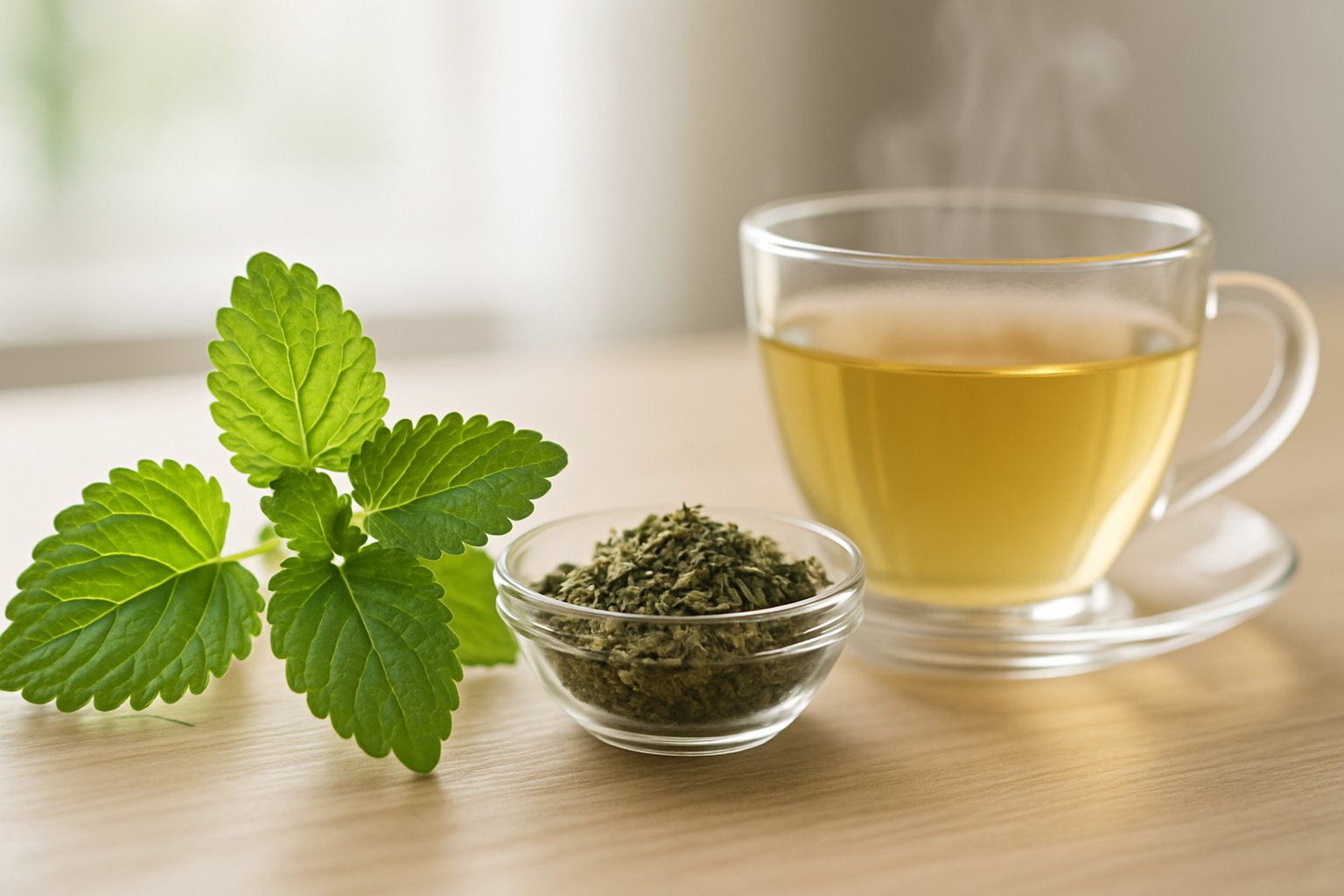Lemon balm effectively reduces anxiety and stress while improving sleep quality through its natural calming properties. The herb aids digestion, boosts cognitive function, and helps heal cold sores with its anti-inflammatory effects. People should consult healthcare providers before using lemon balm regularly, especially if they have health conditions or take medications.
Lemon balm, scientifically known as Melissa officinalis, is a fragrant herb from the mint family that has been used for centuries as a natural remedy. This leafy perennial plant offers a distinctive lemony scent when its leaves are crushed and grows widely across the world today.

Taking lemon balm is good for reducing anxiety and stress, improving sleep quality, aiding digestion, boosting brain function, and helping heal cold sores due to its antiviral and anti-inflammatory properties. Research shows that this versatile herb works by increasing GABA levels in the brain, which creates a calming effect on both the mind and body.
Many people turn to this gentle herb as a natural alternative to pharmaceutical options for mild health concerns. Lemon balm provides soothing benefits[1] for both mental and physical wellness, making it a popular choice for those seeking plant-based remedies.
Key Health Benefits of Taking Lemon Balm

Lemon balm (Melissa officinalis) offers several proven therapeutic effects, particularly for mental wellness and physical comfort. The herb’s active compounds including rosmarinic acid, flavonoids, and essential oils work together to calm the nervous system, support digestive function, and fight viral infections.
Reducing Anxiety and Stress
Lemon balm acts as a natural sedative by increasing GABA levels in the brain. GABA is a neurotransmitter that promotes calmness and reduces nervous system activity. Studies show that lemon balm extract can boost feelings of calm and ease[1] in people experiencing mild anxiety.
The herb’s phenolic compounds and rosmarinic acid help reduce oxidative stress in brain tissue. This antioxidant activity may protect neurons from damage caused by chronic stress hormones.
Active compounds for anxiety relief:
- Rosmarinic acid
- Caffeic acid
- Flavonoids
- Terpenes
Lemon balm tea provides gentle sedative effects without the grogginess associated with pharmaceutical sedatives. Many people find that 1-2 cups daily help manage everyday stress levels.
Lemon balm supplements typically contain standardized plant extracts. These concentrated forms may offer stronger anti-anxiety benefits than tea alone.
Supporting Sleep Quality and Insomnia Relief
The sedative effect of lemon balm makes it useful for sleep disorders, particularly when anxiety causes insomnia. Research suggests the herb’s anti-anxiety properties help people fall asleep more easily[1] without next-day drowsiness.
Lemon balm works differently than synthetic sleep aids. Instead of forcing sleep, it calms racing thoughts and physical tension that prevent natural rest. The herb’s GABA-boosting properties help quiet an overactive mind at bedtime.
Many herbal sleep formulas combine lemon balm with valerian or other sedative herbs. This combination approach may enhance overall sleep quality and duration.
Sleep benefits include:
- Faster sleep onset
- Reduced nighttime anxiety
- Improved sleep quality
- Less morning grogginess
Essential oils from lemon balm leaves can be used in aromatherapy. Diffusing the oil or adding it to bath water may create a relaxing bedtime routine.
Easing Digestive Issues and Indigestion
Lemon balm functions as both an antispasmodic and carminative herb for digestive health. The herb can help calm spasms and colic in the gastrointestinal tract[1], providing relief from bloating, gas, and mild stomach upset.
The plant’s polyphenols and tannins have antimicrobial properties against harmful bacteria like Pseudomonas aeruginosa and Salmonella. This antimicrobial action may help maintain healthy gut bacteria balance.
Lemon balm tea works best for digestive issues when consumed 30 minutes before or after meals. The warm liquid helps activate the herb’s carminative effects while soothing stomach irritation.
Digestive benefits:
- Reduces intestinal spasms
- Relieves gas and bloating
- Calms nausea and indigestion
- Supports healthy digestion
Many over-the-counter digestive remedies contain lemon balm along with ginger and mint. These combination products target multiple aspects of digestive discomfort.
Promoting Relief from Cold Sores and Herpes
Lemon balm demonstrates antiviral activity against herpes simplex virus type 1 (HSV-1), the cause of cold sores. Studies found that topical lemon balm cream cleared cold sores faster than placebo treatments[1] when applied at the first sign of outbreak.
The herb’s rosmarinic acid and caffeic acid compounds inhibit viral replication. These phenolic compounds also provide anti-inflammatory effects that reduce cold sore swelling and pain.
Essential oil from lemon balm must be diluted before skin application. Undiluted essential oils can cause irritation that worsens herpes simplex infections.
Antiviral mechanisms:
- Blocks viral entry into cells
- Reduces viral replication
- Decreases inflammation
- Speeds healing time
Regular use of lemon balm supplements may help reduce the frequency of cold sore outbreaks. The herb’s immune-supporting antioxidants strengthen the body’s natural defenses against viral reactivation.
Potential Side Effects and Safety Considerations

While lemon balm is generally safe for most people, it can cause certain side effects and interactions. Understanding these risks helps ensure safe and effective use of this herbal supplement.
Common Side Effects and Interactions
Lemon balm side effects[2] are typically mild but can affect some users. The most common reactions include nausea, dizziness, and increased appetite.
Digestive Effects:
- Stomach pain or discomfort
- Nausea
- Changes in appetite
Neurological Effects:
- Dizziness or lightheadedness
- Sedation or drowsiness
- Headache in some cases
Skin irritation may occur when using topical lemon balm products. Some people experience wheezing or other respiratory symptoms.
Drug Interactions are a serious concern. Lemon balm can interact with sedative medications, potentially increasing drowsiness. People taking thyroid medications should be cautious, as lemon balm may affect thyroid function[2].
The herb may also interact with HIV medications and glaucoma medications. Anyone taking prescription drugs should consult their doctor before using lemon balm supplements.
Precautions for Specific Populations
Certain groups need extra caution when considering lemon balm use. Pregnancy and breastfeeding safety[2] data is limited, so avoiding use during these times is recommended.
People with thyroid conditions should avoid lemon balm entirely. The herb may worsen hypothyroidism by further reducing thyroid function.
High-Risk Groups:
- Pregnant or breastfeeding women
- People with thyroid disorders
- Those scheduled for surgery within two weeks
- Individuals with known plant allergies
Children may use lemon balm topically for cold sores or orally for short periods under medical supervision. However, long-term use in children lacks safety data.
People with heart conditions should monitor their response carefully, as lemon balm may affect heart rhythm in some cases.
Guidance on Dosage and Forms
The FDA does not regulate herbal supplements like lemon balm, so product quality and strength can vary significantly between brands.
Common Forms and Suggested Doses:
- Tea: 1.5-4.5 grams of dried leaves per cup
- Tincture: 2-6 mL three times daily
- Topical cream: 1% extract applied 2-4 times daily for up to 14 days
Lemon balm supplements up to 500 mg daily[2] for six months appear safe for most adults. Starting with lower doses helps assess individual tolerance.
Essential oils require special caution. Undiluted lemon balm oil is highly toxic and can cause serious symptoms including seizures and breathing problems.
People should stop using lemon balm at least two weeks before scheduled surgery. Prolonged use at high doses may lead to dependency and withdrawal symptoms when discontinued.
Frequently Asked Questions

People often ask about lemon balm’s specific benefits for tea consumption, skin applications, and potential side effects. Common concerns include proper dosing for sleep improvement and effects on heart health and mental well-being.
What are the benefits of drinking lemon balm tea?
Drinking lemon balm tea provides several health benefits. Lemon balm improves mood and cognitive ability[1] based on human studies.
The tea helps calm digestive issues like gas and bloating. It works by reducing spasms in the digestive tract.
Lemon balm tea’s anti-anxiety effects could help with sleep[1] when stress keeps people awake. One to two cups per day is considered safe for most people.
The herb increases GABA levels in the brain. This brain chemical creates a calming effect that reduces stress and anxiety.
How does lemon balm affect skin health?
Lemon balm shows strong benefits for treating cold sores. Studies found that lemon balm has antiviral activity that can inhibit the Herpes simplex virus[1].
Research shows that creams containing lemon balm clear cold sores faster than placebos. The herb also has anti-inflammatory properties that soothe irritated skin.
People should dilute lemon balm essential oil with carrier oils like coconut or sweet almond oil. Full-strength essential oil can irritate skin and make problems worse.
What are the known side effects of consuming lemon balm?
Some people experience headaches, dizziness, or upset stomach from lemon balm. These side effects are generally mild but can occur with regular use.
Herbs can be just as powerful as medications and cause unwanted side effects[1]. People should talk with healthcare providers before taking supplements.
No studies address the safety of long-term lemon balm use. People should stop taking the herb if mild health issues don’t improve after one to two weeks.
Can lemon balm influence heart health adversely?
Supplementation with lemon balm can improve blood lipids and blood pressure[3] according to research studies. This suggests positive rather than negative effects on heart health.
Current research does not indicate that lemon balm causes adverse heart effects in healthy people. However, people taking heart medications should consult doctors before use.
The herb’s calming properties may actually support heart health by reducing stress. Chronic stress negatively impacts cardiovascular function.
What is the recommended dosage of lemon balm for improving sleep?
People taking lemon balm pills or capsules should follow package directions for dosage. With lemon balm tea, one or two cups per day is likely safe[1].
No specific sleep dosage recommendations exist from major medical organizations. Most studies use varying amounts of lemon balm extract.
People should not take more than directed on product packages. Those with consistent sleep problems should talk to physicians for proper evaluation.
Does lemon balm have an impact on mental well-being and anxiety relief?
Lemon balm extract can increase levels of gamma-aminobutyric acid (GABA), a neurotransmitter that has a calming effect[1]. This helps reduce anxiety and stress levels.
Research suggests lemon balm may help improve symptoms of depression compared to placebos. The herb might boost serotonin levels, which are important for mood regulation.
If people have mild anxiety or are dealing with stressful situations, lemon balm may provide some relief[1]. However, herbs are not comprehensive treatments for serious anxiety or chronic stress.
References
- 6 Benefits of Lemon Balm. https://health.clevelandclinic.org/lemon-balm-benefits Accessed October 22, 2025
- Lemon Balm: Herbal Uses, Benefits, Side Effects. https://www.medicinenet.com/lemon_balm/article.htm Accessed October 22, 2025
- Lemon Balm benefits, dosage, and side effects. https://examine.com/supplements/lemon-balm/ Accessed October 22, 2025
